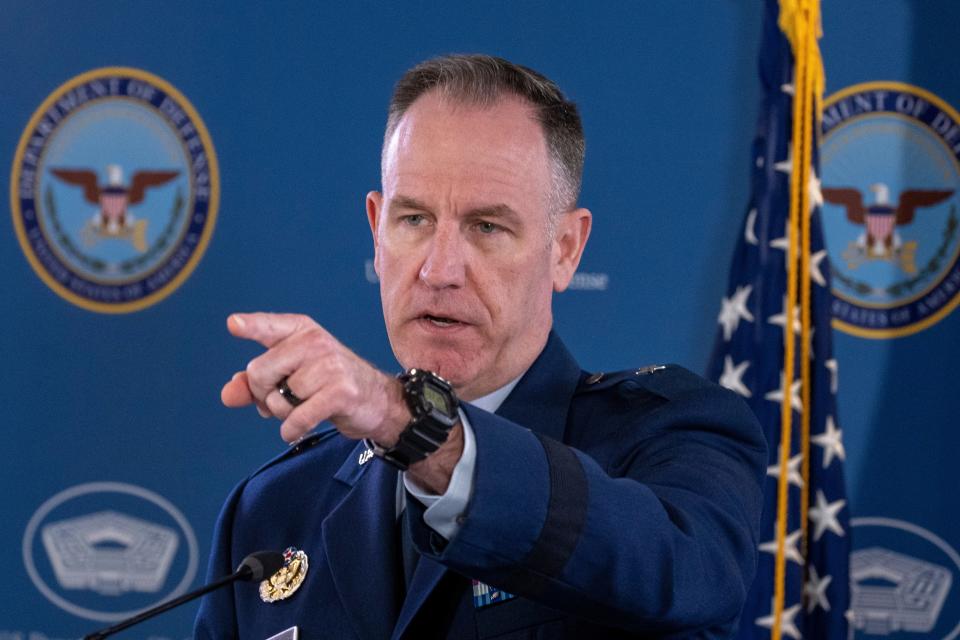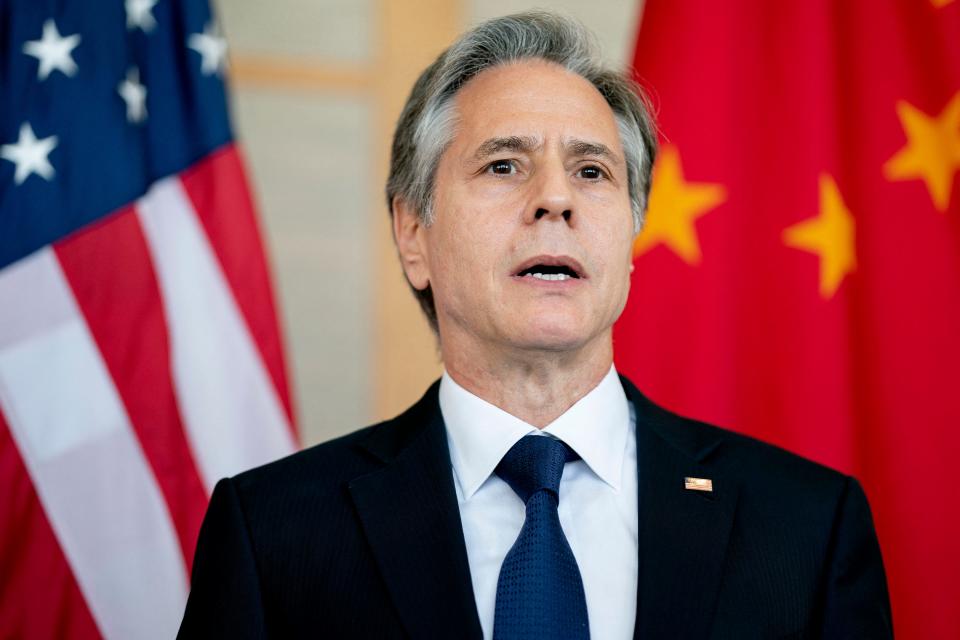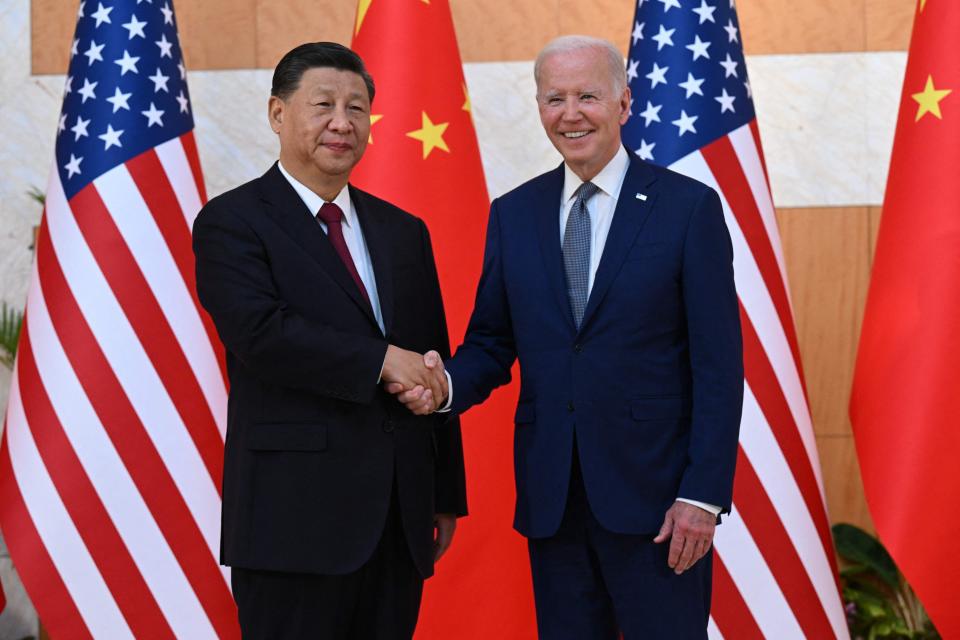Blinken postpones China trip amid spy balloon row; US officials scramble to get rid of it
WASHINGTON – Secretary of State Antony Blinken postponed an imminent trip to China because a Chinese surveillance balloon drifting over the U.S. is a "clear violation" of sovereignty and international law, Biden administration officials said Friday.
Blinken will reschedule the trip when conditions are right, officials said.
Although the trip had not been officially announced, Blinken had been set to leave Friday night, a day after the Pentagon announced it had spotted what it identified as a spy balloon flying over the U.S.
China disputed that characterization, calling it a “civilian airship” that blew off course.
Later Friday, the Pentagon acknowledged reports of a second balloon flying over Latin America. "We now assess it is another Chinese surveillance balloon,” Brig. Gen. Pat Ryder, Pentagon press secretary, said in a statement, declining to offer further information such as where it was spotted.
Some lawmakers criticized the Biden administration for how it has handled the situation, and for not taking stronger action against China. Sen. John Tester, a Montana Democrat and chairman of the Defense Appropriations Subcommittee, said his committee will hold a hearing on the matter. “China’s actions are a clear threat to those values and to America’s national security, and I’m demanding answers from the Biden Administration," he said in a statement. "I will be pulling people before my committee to get real answers on how this happened, and how we can prevent it from ever happening again.”
The airship over the U.S. is used for meteorological and other research, the Chinese government said in a statement in which it expressed regret for the balloon's “unintended entry” into U.S. airspace.
U.S. officials stand by their assessment.
“We know that it’s a surveillance balloon,” Ryder later told reporters.
The balloon seen over U.S. air space is likely to remain over the United States for a few days, Ryder said.
Shooting down the airship poses too high a risk to people and property from debris, two U.S. officials said Friday. Other options are being explored, according to the officials who were not authorized to speak publicly.
The incident comes at a time of rising tension between the superpowers.
"It’s very difficult for the U.S. to take a position which shows restraint; it’s going to require the Chinese to do so as well," Scott Kennedy, an expert on China at the Center for Strategic and International Studies, said in a recent public discussion about Blinken's trip and the state of relations between the nations. "I think for both foreign policy reasons and domestic political reasons, we are at a place we were not at 10 years ago."
The latest
Where it is: The balloon had been drifting over Montana where the Pentagon has nuclear missile silos. On Friday, the balloon was located over the center of the U.S. at about 60,000 feet moving eastward, the Pentagon's Ryder told reporters.
What it is: The balloon is designed for surveillance, according to the Pentagon. But it likely is unable to collect more information than is available to spy satellites.
Steps taken: While the Pentagon decided against shooting down the balloon, the government took steps to prevent it from collecting sensitive information.
Fighter jets sent: F-22 fighter jets, the most advanced warplane in the Pentagon's arsenal, were sent to observe the balloon.
Not first time: It’s not the first time Chinese spy balloons have flown over the United States, an official said.
Not a risk to aircraft: The balloon is flying so high that it does not present a danger to civilian aircraft, Air Force Gen. Glen VanHerck, commander of U.S. Northern Command and North American Aerospace Defense Command, said in a statement.

Why it matters
Tensions have been rising with China, which the U.S. considers its biggest strategic and economic competitor. The nations have clashed over Taiwan, technology, human rights, Russia’s invasion of Ukraine and other issues.
The Biden administration has been trying to stabilize the relationship, building what it’s called “guardrails” as it normalizes interaction.
After a three-hour meeting with Chinese President Xi Jinping on the sidelines of the G-20 summit in November, President Joe Biden said both countries share a responsibility to "manage our differences, prevent competition from becoming anything ever to near conflict, and to find ways to work together on urgent global issues that require our mutual cooperation."
Xi responded that the world "expects that China and the United States will properly handle the relationship."

Maintaining a dialogue
Blinken was set to travel to China as an outgrowth of Biden’s meeting with Xi.
Both leaders had agreed to get their teams together to try to restore some of the lines of communication. Beijing had suspended or canceled eight official military dialogues and cooperation channels with the U.S. after former House Speaker Nancy Pelosi, D-Calif., visited Taiwan in August.
Last month, Treasury Secretary Janet Yellen met with her Chinese counterpart in Switzerland to work on repairing relations.
But senior State Department officials said it wouldn’t have been constructive for Blinken to go to China right now. The spy balloon incident would have detracted from the planned “broad, substantive agenda,” according to officials.
Blinken hopes to reschedule “at the earliest opportunity, when conditions allow” officials said.

Rising tensions
Tensions were already rising before the arrival of the Chinese balloon. Among recent developments:
Increased military presence: The U.S. is nearly doubling its military presence in the Philippines under an agreement announced Thursday that’s part of an effort to counter China’s threats to Taiwan and growing Chinese influence in the Indo-Pacific region.
Taiwan invasion? A top Air Force general recently predicted that the U.S. will be at war with China over Taiwan in two years. But Gen. Mark Milley, chairman of the Joint Chiefs of Staff, said in November it will be “some time” before the Chinese have the military capability to invade Taiwan.
Limiting chip access: After the Biden administration last year imposed export controls to limit China’s ability to access advanced computer chips, Japan and the Netherlands agreed recently to restrict China’s access to materials needed to make the chips. The chips can be used to make advanced military systems.
GOP response: Congressional Republicans are criticizing the Biden administration for not dealing with China more forcefully. Soon after taking control of the House in January, Republicans created a committee aimed at increasing U.S. competitiveness with China.
TikTok troubles: More than half the states have banned TikTok on government devices. There are also national security concerns, including the possibility that Beijing could use the China-owned platform to control data collection on millions of users, according to FBI Director Christopher Wray.
Want to know more? Here's what you missed
Related: US plans to expand its military presence in Philippines to counter threats against Taiwan
Biden, Trump, Pence aren't alone: Millions access sensitive documents, mishandling is common
More: GOP removes Rep. Ilhan Omar from Foreign Affairs Committee, citing her comments on Israel
This article originally appeared on USA TODAY: China says spy balloon flying over US is a 'civilian airship'

 money
money 